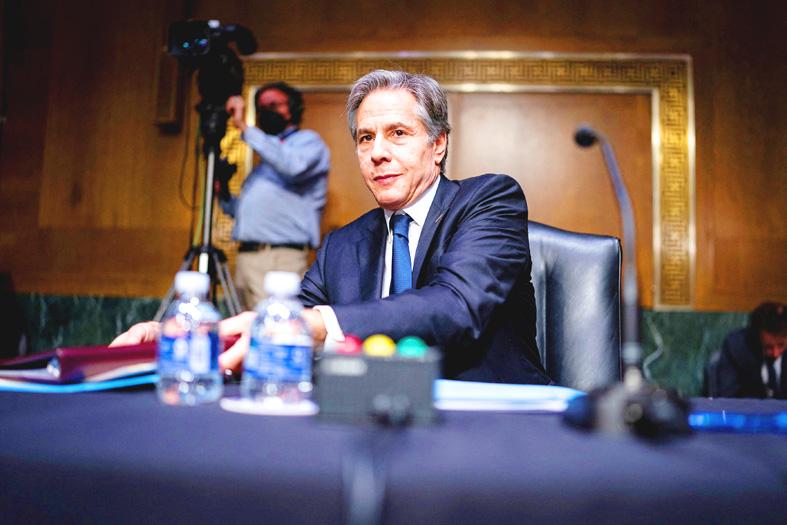Taiwan’s chip sector is vital to help the US maintain a technology edge over China, US Secretary of State Antony Blinken told a hearing of the US Senate Foreign Relations Committee in Washington on Tuesday.
Senators quizzed Blinken about whether the US would help Taiwan if it were attacked by China, especially given the nation’s importance in the global semiconductor industry.
Blinken said that the US has a significant advantage over China in its ability to produce high-end semiconductors and there are a few countries, including Taiwan, that are critical components of that ability.

Photo: Reuters
The US is taking significant steps with Taiwan, Japan and the Netherlands, among others, to make sure “the highest-end semiconductors are not transferred to China, or China does not get the technology to manufacture them,” he said.
“Taiwan is integral to that,” he added.
The question from US Senator Robert Menendez, who said he was asked on a recent trip to Taiwan, Australia and Japan whether the US could meet the demands of its strategic competition with China without a clear economic and trade agenda in the region.
If China were to control Taiwan, which produces 90 percent of all high-end semiconductors, “the world would be in a world of hurt,” Menendez said.
Given those circumstances, if the US did not help Taiwan in the event of a Chinese attack, it would send a message to other countries that if Washington “didn’t do it for Taiwan, they’re not going to do it for us,” he said.
US Senator Jim Risch urged Blinken to do more to help Taiwan.
“We started too late in providing security assistance to Ukraine,” Risch said. “We cannot make the same mistake with Taiwan. Supporting an island during the war is much more difficult. Our assistance must be there beforehand.”
Blinken said that the US is determined that Taiwan would have “all necessary means to defend itself against any potential aggression, including unilateral action by China to disrupt the status quo” that has been in place for many decades.
In addition to arms sales to Taiwan, the US has expedited third-party transfers to support an indigenous defense capability and is focused on helping Taiwan as it improves its asymmetric capabilities, he said.

A magnitude 5.6 earthquake struck off the coast of Yilan County at 12:37pm today, with clear shaking felt across much of northern Taiwan. There were no immediate reports of damage. The epicenter of the quake was 16.9km east-southeast of Yilan County Hall offshore at a depth of 66.8km, Central Weather Administration (CWA) data showed. The maximum intensity registered at a 4 in Yilan County’s Nanao Township (南澳) on Taiwan’s seven-tier scale. Other parts of Yilan, as well as certain areas of Hualien County, Taipei, New Taipei City, Taoyuan, Hsinchu County, Taichung and Miaoli County, recorded intensities of 3. Residents of Yilan County and Taipei received

Taiwan has secured another breakthrough in fruit exports, with jujubes, dragon fruit and lychees approved for shipment to the EU, the Ministry of Agriculture said yesterday. The Animal and Plant Health Inspection Agency on Thursday received formal notification of the approval from the EU, the ministry said, adding that the decision was expected to expand Taiwanese fruit producers’ access to high-end European markets. Taiwan exported 126 tonnes of lychees last year, valued at US$1.48 million, with Japan accounting for 102 tonnes. Other export destinations included New Zealand, Hong Kong, the US and Australia, ministry data showed. Jujube exports totaled 103 tonnes, valued at

BIG SPENDERS: Foreign investors bought the most Taiwan equities since 2005, signaling confidence that an AI boom would continue to benefit chipmakers Taiwan Semiconductor Manufacturing Co’s (TSMC, 台積電) market capitalization swelled to US$2 trillion for the first time following a 4.25 percent rally in its American depositary receipts (ADR) overnight, putting the world’s biggest contract chipmaker sixth on the list of the world’s biggest companies by market capitalization, just behind Amazon.com Inc. The site CompaniesMarketcap.com ranked TSMC ahead of Saudi Aramco and Meta Platforms Inc. The Taiwanese company’s ADRs on Tuesday surged to US$385.75 on the New York Stock Exchange, as strong demand for artificial intelligence (AI) applications led to chip supply constraints and boost revenue growth to record-breaking levels. Each TSMC ADR represents

TRUST: The KMT said it respected the US’ timing and considerations, and hoped it would continue to honor its commitments to helping Taiwan bolster its defenses and deterrence US President Donald Trump is delaying a multibillion-dollar arms sale to Taiwan to ensure his visit to Beijing is successful, a New York Times report said. The weapons sales package has stalled in the US Department of State, the report said, citing US officials it did not identify. The White House has told agencies not to push forward ahead of Trump’s meeting with Chinese President Xi Jinping (習近平), it said. The two last month held a phone call to discuss trade and geopolitical flashpoints ahead of the summit. Xi raised the Taiwan issue and urged the US to handle arms sales to